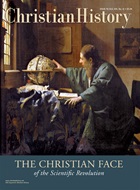Since tradition proscribed marriage for university faculty, Galileo's lifelong union with Marina Gamba was not officially sanctioned. Marina bore Galileo two daughters and a son. His fatherly affection was as great as if they had been his legitimate offspring.
Knowing that his daughters, born out of wedlock, would therefore never be able to marry anyone but stable hands or peasants, Galileo got them accepted at ages 12 and 13 into a Franciscan community of Poor Clares near Florence. When his elder daughter, Virginia, made her final vows as a nun, she took the name Sister Celeste—a reference to her father's devotion to studying the heavens. The younger Livia took the name Sister Arcangela.
As the years went by, Sister Celeste assumed more and more of the responsibility for running the convent, which was desperately poor. Ironically, the plague that wracked Europe during these years never affected the convent, probably because rats found nothing to eat there.
One of the convent's few literate nuns, Sister Celeste must have been educated at home in her early years, quite possibly by her father. Over 100 of her letters to Galileo survive, evidence of how highly he valued her correspondence.
Through the years, she baked treats and did needlework for her father. And Galileo sent fresh fruits from his orchard and, before his house arrest, visited his daughters at the convent, which he could see from his villa above Florence.
Sister Celeste's help was not limited to cooking and sewing, however. She served as final copyist for her father's manuscripts. Before he left Florence for his disastrous last trip to Rome, he entrusted his financial affairs to his daughter, who had obviously inherited his mathematical aptitude. She also used her spiritual gifts to mediate conflicts between her father and brother.
Sister Celeste continued to write to Galileo during his ordeal with the Inquisition, concerned for his health, both physical and spiritual. Realizing that her letters might be seen by unfriendly eyes in Rome, she phrased her encouragement to her father tactfully.
When he expressed his frustration with ecclesiastical strictures, she advised patience and humility, neither of which were Galileo's strong suits. When the Inquisition ordered Galileo to say the penitential Psalms every week for the next three years, his daughter volunteered to take on the task on his behalf.
Unfortunately, Sister Celeste died of dysentery at thirtyfour, only four months after her father's return. A grieving Galileo wrote to a friend that his daughter had been "a woman of exquisite intellect and surpassing goodness."
—Virginia Stem Owens
Copyright © 2002 by the author or Christianity Today/Christian History magazine.
Click here for reprint information on Christian History.

Support Our Work
Subscribe to CT for less than $4.25/month




























